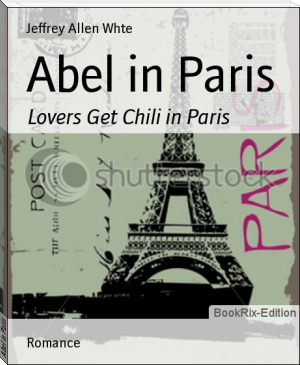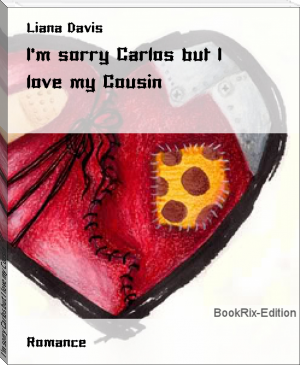Romeo and Juliet by William Shakespeare (beach books txt) 📖

- Author: William Shakespeare
Book online «Romeo and Juliet by William Shakespeare (beach books txt) 📖». Author William Shakespeare
Your part in her you could not keep from death, But heaven keeps his part in eternal life.
The most you sought was her promotion;
For ’twas your heaven she should be advanced: And weep ye now, seeing she is advanced Above the clouds, as high as heaven itself?
O, in this love, you love your child so ill, That you run mad, seeing that she is well: She’s not well married that lives married long;
But she’s best married that dies married young. Dry up your tears, and stick your rosemary
On this fair corse; and, as the custom is, In all her best array bear her to church:
For though fond nature bids us an lament,
Yet nature’s tears are reason’s merriment.
CAPULET: All things that we ordained festival, Turn from their office to black funeral;
Our instruments to melancholy bells, Our wedding cheer to a sad burial feast, Our solemn hymns to sullen dirges change, Our bridal flowers serve for a buried corse,
And all things change them to the contrary.
FRIAR LAURENCE: Sir, go you in; and, madam, go with him;
And go, Sir Paris; every one prepare
To follow this fair corse unto her grave:
The heavens do lour upon you for some ill; Move them no more by crossing their high will.
[Exeunt CAPULET, LADY CAPULET, PARIS, and FRIAR LAURENCE.]
First Musician: Faith, we may put up our pipes, and be gone.
Nurse: Honest goodfellows, ah, put up, put up;
For, well you know, this is a pitiful case.
[Exit.]
First Musician: Ay, by my troth, the case may be amended.
[Enter PETER.]
PETER: Musicians, O, musicians, ‘Heart’s ease, Heart’s ease:’ O, an you will have me live, play ‘Heart’s
ease.’
First Musician: Why ‘Heart’s ease?’
PETER: O, musicians, because my heart itself plays ‘My heart is full of woe:’ O, play me some merry dump,
to comfort me.
First Musician: Not a dump we; ’tis no time to play now.
PETER: You will not, then? First Musician: No.
PETER: I will then give it you soundly.
First Musician: What will you give us?
PETER: No money, on my faith, but the gleek; I will give you the minstrel.
First Musician: Then I will give you the serving-crea- ture.
PETER: Then will I lay the serving-creature’s dagger on your pate. I will carry no crotchets: I’ll re you,
I’ll fa you; do you note me?
First Musician: An you re us and fa us, you note us. Second Musician: Pray you, put up your dagger, and
put out your wit.
PETER: Then have at you with my wit! I will dry-beat you with an iron wit, and put up my iron dagger. Ans-
wer me like men:
‘When griping grief the heart doth wound, And doleful dumps the mind oppress,
Then music with her silver sound’—
why ‘silver sound’? why ‘music with her silver sound’? What say you, Simon Catling?
Musician: Marry, sir, because silver hath a sweet sound. PETER: Pretty! What say you, Hugh Rebeck?
Second Musician: I say ‘silver sound,’ because musi- cians sound for
silver.
PETER: Pretty too! What say you, James Soundpost? Third Musician: Faith, I know not what to say.
PETER: O, I cry you mercy; you are the singer: I will say for you. It is ‘music with her silver sound,’ because musicians have no gold for sounding: ‘Then music with her silver sound With speedy help doth lend redress.’
[Exit.]
First Musician: What a pestilent knave is this same!
Second Musician: Hang him, Jack! Come, we’ll in here;
tarry for the mourners, and stay dinner. [Exeunt.]
ACT V
SCENE I: Mantua. A street.
[Enter ROMEO.]
ROMEO: If I may trust the flattering truth of sleep, My dreams presage some joyful news at hand:
My bosom’s lord sits lightly in his throne; And all this day an unaccustom’d spirit
Lifts me above the ground with cheerful thoughts. I dreamt my lady came and found me dead— Strange dream, that gives a dead man leave
to think!—
And breathed such life with kisses in my lips, That I revived, and was an emperor.
Ah me! how sweet is love itself possess’d, When but love’s shadows are so rich in joy!
[Enter BALTHASAR, booted.]
News from Verona!—How now, Balthasar!
Dost thou not bring me letters from the friar? How doth my lady? Is my father well?
How fares my Juliet? that I ask again; For nothing can be ill, if she be well.
BALTHASAR: Then she is well, and nothing can be ill: Her body sleeps in Capel’s monument,
And her immortal part with angels lives. I saw her laid low in her kindred’s vault, And presently took post to tell it you:
O, pardon me for bringing these ill news, Since you did leave it for my office, sir.
ROMEO: Is it even so? then I defy you, stars! Thou know’st my lodging: get me ink and paper, And hire post-horses; I will hence to-night.
BALTHASAR: I do beseech you, sir, have patience: Your looks are pale and wild, and do import
Some misadventure.
ROMEO: Tush, thou art deceived: Leave me, and do the thing I bid thee do.
Hast thou no letters to me from the friar?
BALTHASAR: No, my good lord.
ROMEO: No matter: get thee gone, And hire those horses; I’ll be with thee straight.
[Exit BALTHASAR.]
Well, Juliet, I will lie with thee to-night.
Let’s see for means: O mischief, thou art swift
To enter in the thoughts of desperate men! I do remember an apothecary,—
And hereabouts he dwells,—which late I noted In tatter’d weeds, with overwhelming brows, Culling of simples; meagre were his looks,
Sharp misery had worn him to the bones: And in his needy shop a tortoise hung, An alligator stuff’d, and other skins
Of ill-shaped fishes; and about his shelves
A beggarly account of empty boxes,
Green earthen pots, bladders and musty seeds, Remnants of packthread and old cakes of roses, Were thinly scatter’d, to make up a show.
Noting this penury, to myself I said
‘An if a man did need a poison now, Whose sale is present death in Mantua,
Here lives a caitiff wretch would sell it him.’
O, this same thought did but forerun my need; And this same needy man must sell it me.
As I remember, this should be the house. Being holiday, the beggar’s shop is shut. What, ho! apothecary!
[Enter Apothecary.] Apothecary: Who calls so loud? ROMEO: Come hither, man. I see that thou art poor:
Hold, there is forty ducats: let me have
A dram of poison, such soon-speeding gear As will disperse itself through all the veins That the life-weary taker may fall dead
And that the trunk may be discharged of breath
As violently as hasty powder fired
Doth hurry from the fatal cannon’s womb.
Apothecary: Such mortal drugs I have; but Mantua’s
law
Is death to any he that utters them.
ROMEO: Art thou so bare and full of wretchedness, And fear’st to die? famine is in thy cheeks,
Need and oppression starveth in thine eyes, Contempt and beggary hangs upon thy back; The world is not thy friend nor the world’s law; The world affords no law to make thee rich; Then be not poor, but break it, and take this.
Apothecary: My poverty, but not my will, consents. ROMEO: I pay thy poverty, and not thy will. Apothecary: Put this in any liquid thing you will,
And drink it off; and, if you had the strength
Of twenty men, it would dispatch you straight.
ROMEO: There is thy gold, worse poison to men’s souls, Doing more murders in this loathsome world,
Than these poor compounds that thou mayst not sell. I sell thee poison; thou hast sold me none.
Farewell: buy food, and get thyself in flesh. Come, cordial and not poison, go with me
Act V, scene ii
To Juliet’s grave; for there must I use thee.
[Exeunt.] SCENE II: Friar Laurence’s cell.
[Enter FRIAR JOHN.]
FRIAR JOHN: Holy Franciscan friar! brother, ho! [Enter FRIAR LAURENCE.]
FRIAR LAURENCE: This same should be the voice of Friar John. Welcome from Mantua: what says Romeo? Or, if his mind be writ, give me his letter.
FRIAR JOHN: Going to find a bare-foot brother out
One of our order, to associate me, Here in this city visiting the sick,
And finding him, the searchers of the town, Suspecting that we both were in a house Where the infectious pestilence did reign,
Seal’d up the doors, and would not let us forth; So that my speed to Mantua there was stay’d.
FRIAR LAURENCE: Who bare my letter, then, to Romeo? FRIAR JOHN: I could not send it,—here it is again,—
Nor get a messenger to bring it thee,
So fearful were they of infection.
FRIAR LAURENCE: Unhappy fortune! by my brother hood,
The letter was not nice but full of charge
Of dear import, and the neglecting it
May do much danger. Friar John, go hence; Get me an iron crow, and bring it straight Unto my cell.
FRIAR JOHN: Brother, I’ll go and bring it thee. [Exit.]
FRIAR LAURENCE: Now must I to the monument alone; Within three hours will fair Juliet wake:
She will beshrew me much that Romeo
Hath had no notice of these accidents;
But I will write again to Mantua,
And keep her at my cell till Romeo come;
Poor living corse, closed in a dead man’s tomb! [Exit.]
SCENE III: A churchyard; in it a tomb belonging to the
Capulets.
[Enter PARIS, and his Page bearing flowers and a torch.]
PARIS: Give me thy torch, boy: hence, and stand aloof: Yet put it out, for I would not be seen.
Under yond yew-trees lay thee all along, Holding thine ear close to the hollow ground; So shall no foot upon the churchyard tread, Being loose, unfirm, with digging up of graves, But thou shalt hear it: whistle then to me,
As signal that thou hear’st something approach. Give me those flowers. Do as I bid thee, go.
PAGE: [Aside] I am almost afraid to stand alone
Here in the churchyard; yet I will adventure.
[Retires.]
PARIS: Sweet flower, with flowers thy bridal bed I
strew,—
O woe! thy canopy is dust and stones;— Which with sweet water nightly I will dew,
Or, wanting that, with tears distill’d by moans: The obsequies that I for thee will keep
Nightly shall be to strew thy grave and weep. [The Page whistles.]
The boy gives warning something doth approach. What cursed foot wanders this way to-night,
To cross my obsequies and true love’s rite? What with a torch! muffle me, night, awhile.
[Retires.]
[Enter ROMEO and BALTHASAR, with a torch, mattock, &c.]
ROMEO: Give me that mattock and the wrenching iron.
Hold, take this letter; early in the morning
See thou deliver it to my lord and father.
Give me the light: upon thy life, I charge thee, Whate’er thou hear’st or seest, stand all aloof, And do not interrupt me in my course.
Why I descend into this bed of death, Is partly to behold my lady’s face;
But chiefly to take thence from her dead finger
A precious ring, a ring that I must use
In dear employment: therefore hence, be gone: But if thou, jealous, dost return to pry
In what I further shall intend to do,
By heaven, I will tear thee joint by joint
And strew this hungry churchyard with thy limbs: The time and my intents are savage-wild,
More fierce and more inexorable far
Than empty tigers or the roaring sea.
BALTHASAR: I will be gone, sir, and not trouble you. ROMEO: So shalt thou show me friendship. Take thou
that:
Live, and be prosperous: and farewell, good fellow.
BALTHASAR: [Aside] For all this same, I’ll hide me
hereabout:
His looks I fear, and his intents I doubt. [Retires.]
ROMEO: Thou detestable maw, thou womb of death, Gorged with the dearest morsel of the earth,
Thus I enforce thy rotten jaws to open,
And, in despite, I’ll cram thee with more food! [Opens the tomb.]
PARIS: This is that banish’d haughty Montague, That murder’d my love’s cousin, with which grief, It is supposed, the fair creature died;
And here is come to do some villanous shame
To the dead bodies: I will apprehend him. [Comes forward.]
Stop thy unhallow’d toil, vile Montague!
Can vengeance be pursued further than death? Condemned villain, I do apprehend thee:
Obey, and go with me; for thou must die.
ROMEO: I must indeed; and therefore came I hither.
Good gentle youth, tempt not a desperate man;
If thou be merciful,
[Falls.]
Fly hence, and leave me: think upon these gone; Let them affright thee. I beseech thee, youth, Put not another sin upon my head,
By urging me to fury: O, be gone!
By heaven, I love thee better than myself; For I come hither arm’d against myself: Stay not, be gone; live, and hereafter say, A madman’s mercy bade thee run away.
PARIS:
 Reading books romantic stories you will plunge into the world of feelings and love. Most of the time the story ends happily. Very interesting and informative to read books historical romance novels to feel the atmosphere of that time.
Reading books romantic stories you will plunge into the world of feelings and love. Most of the time the story ends happily. Very interesting and informative to read books historical romance novels to feel the atmosphere of that time.




Comments (0)